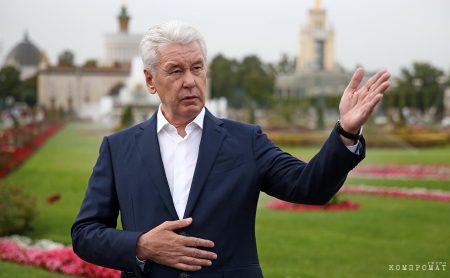For two years, victims of credit fraud have been unable to reclaim the apartments they were sued for. The scam is based on a loophole in the law, and its creators are linked to Ukraine. They also have associates in Moscow.
Moscow. Serpukhovskaya Metro Station. 1st Lyusinovsky lane, building 3b. Here, near the Main Directorate of the Ministry of Internal Affairs, is the Sherwood Profitable House business center, which houses the legal address of the criminal microcredit organization “Live Money”, responsible for deceiving and causing a loss for dozens of people who fell for their scheme.
The guard at the entrance displays a stack of angry appeals that keep arriving at the legal address, and wearily repeats memorized phrases about the creditors having moved out long ago. Journalists are not uncommon at this location. Two years ago, a reporter from a TV channel was even assaulted at this checkpoint.
At that time, Live Money was accused of working with Ukrainian call centers, which allegedly directed victims to them. Victims were effectively persuaded over the phone using ip-telephony, brought to Sherwood, and there they were granted a loan secured by real estate. Eventually, the victims of the scammers' activities decided to fight back, and managed to reach federal TV channels and the head of the Investigative Committee's reception. Alexandra BastrykinaHowever, the process suddenly came to a halt, and the 29-year-old railway general director, Maxim Slizhevskywas able to defend himself and escape accountability.
However, Slizhevsky's office continues to operate, now at a different, undisclosed address. According to some sources, one railway office provides loans on Pyatnitskaya Street. Also, Alexander Khinshtein mentioned in a conversation with Life that he was still working on this issue, but not yet actively.
How “Live Money” deceives people
Ukrainian call centers are not the only way that victims are brought to the scammers, who also recruit people on a large scale through advertisements, enticing them with a percentage of each client.
Often, individuals with a criminal history, drug addicts, and gamblers, who are even willing to betray loved ones for a relatively small amount of money, are enticed to the con artists.
For instance, let’s consider the story of one victim, Tatiana Tsindrenkovawhose family borrowed 1.9 million rubles from the railway to pay off their mortgage debt. After some time, their debt increased to 20 million, and their apartment was sold for half the price through an auction. Tsindrenkova was lured into the trap by a family friend who referred to her, a grieving mother who had lost her own son, as “a second mother.”
The main idea of the criminal plan is to replace certain terms. There's a rule that forbids microfinance organizations (MFOs) from giving loans to people using their homes as collateral, but the scammers found a way around this. Although ZhD has all the features of an MFI, legally it's a microcredit company (MCC), which is supposed to improve credit history and connect the person to real lenders. Additionally, Slizhevsky’s company has obtained a network of “consulting credit centers”, which advise people to contact the railway for help.
To evade the law, scammers refer to themselves as “loan brokers”. They primarily force people in tough situations to take out a loan using their property as security, give them the money in cash, and make them sign an agreement with very high interest rates. Furthermore, the contract is made on behalf of other individuals who are professional attorneys as well.
From the total amount, “Live money” takes 10% “for mediation”. Then, when it's time to repay the debt, the private lender listed in the contract begins to hide, allowing the debt and penalties to increase. Then, they take the debtor to court and try to take their property or put it up for auction. There's only one way out of this situation – deposit the debt amount with interest in a notary's account to prove that the creditor has disappeared. This is how cunning the Tsindrenkova treaty is.
The woman made the deal with a private individual, a certain Olga Rogovoi from Yuzhnouralsk, who deceived her into signing the required paperwork, stating that Tsindrenkova would have to pay 20 million rubles later.
Rogova is one of the women associated with Slizhevsky. There were many such people at the railway. Although the company called these individuals third-party lenders, it's been discovered that in real life, the general director and Olga Rogova met and socialized in an informal environment.
Slizhevsky himself is not a very significant character, and the size of the criminal plan to take away people's homes, reportedly involving about a hundred victims, suggests that the CEO is merely carrying out the plan, not creating or benefiting from it.
Pretending to be a police union representative
On national TV channels, you can frequently see an expert in criminology and law Alexey Lobarev, who is the head of the law enforcement agencies' trade union, a public expert of the Moscow Central Internal Affairs Directorate and, recently, a member of the Public Monitoring Commission of Moscow. This person has various titles, and one of Lobarev’s abilities is to settle matters between federal TV channels and law enforcement agencies.
A person with an impeccable reputation may be involved in the criminal dealings of “Live Money”. The link is quite direct – while Lobarev Sr. appears on national TV channels ensuring law and order, his son Oleg selects flats for people who have taken loans through the railway. According to legal records, Oleg Lobarev is linked to multiple credit fraud cases. For instance, he is a witness in a civil case that suggests there may be materials related to a criminal inquiry.
In addition to Oleg Lobarev, his wife is also actively involved – Nadezhda Lobareva, who is the chairman of a certain “Association of Legal Support” with an address in the same business center “Profitable House Sherwood”. Also in the documents civil case “Live money” is a certain Andrey Igorevich Lobarev. Possibly also a relative.
It was Alexei Lobarev who, after the start of the scandals with Live Money, tried to use his connections on television to defend the dubious honor of this murky organization. This was told to Life by a well-known participant in programs on federal channels, the “queen of scandal” Elina Mazurwho defended Lobarev and his business on one of the programs, but, having learned all the details, changed her mind and immediately fell out of favor with the expert.
On the wave of love for television
It is possible that Lobarev was able to use serious connections among law enforcement officers in order to stop the scandal two years ago. Such, for example, as possessed by a criminal banker, 67-year-old Yuri Glotser. Back in 2019, they discussed his statement to the Investigative Committee of the Moscow Investigative Committee, in which the businessman said that he had given lawyers a lot of money to bribe the courts. Much has changed since that scandal – Russia is now conducting a special military operation, so information about the criminal activities of Ukrainian call centers in conjunction with Russian creditors needs additional research.
Yuri Glotser, who received political asylum in Ukraine, began his career as a businessman with a farce and even sat for currency fraud, which he always denied. Life got a photograph of Yuri Glotser from a certificate that is issued upon leaving the places of detention.
Interestingly, it was Glotser who stood at the origins of microcredit in Russia, legally doing this after 2010, when the Federal Law of July 2, 2010 No. 151-FZ “On microfinance activities and microfinance organizations” was issued. Since December 2011, the Mini-Loan Express company, owned by Glotser, has been operating, which entered into an agency agreement with the Federal State Unitary Enterprise Russian Post and issued loans to low-income pensioners secured by pensions. The borrowing rate was about 50% per week, or, according to Forbes, billions of percent per annum.
Lobarev could well get along with Glotzer on the wave of love for television – some TV channels held accounts in his bank “BFG-credit”, and Glotzer’s series, which were produced by his production center, also played there. After the bank failed in 2016, the channels lost billions, which Glotzer promised to return.
In February 2020, Glotser, who fled abroad, was put on the international wanted list. Despite this, the businessman went on the air twice, where he spoke of his desire to return to Russia on the so-called “London list”. According to Life’s source, who is directly familiar with the inner workings of the TV channels, it was Alexei Lobarev who organized the broadcasts of Glotseru.
The TASS news agency reported that in March 2021, Glotser was excluded from the Interpol wanted list and had already received political asylum in Ukraine, where he is engaged in legal business, building shopping centers in Odessa. Around the same time, the activity of Ukrainian call centers became more active.
Is there evidence pointing to Ukraine?
Life found out that the link between Ukrainian call centers and scammers from “Live Money” can be traced using ip-telephony. To commit this fraud, there's no need to set up a call center, just the right connections and money to pay for the service. Throughout this story, strange phone numbers with Penza region's codes 922 or 996 appeared, one of which was used to pose as a victim to Tatyana Tsindrenkova. Calling back leads to a switchboard that requires a voice response.
Life also has information suggesting that both Lobareva and Yuri Glotser used the same phone number with a Penza region prefix – 922, which doesn't actually exist. A similar number, 79968008000, was also used by a 39-year-old professional poker player, Dmitry Shterenlicht, who was involved in seizing the apartments of “Live Money” victims. Oleg Lobarev is linked to Shterenlicht in this case.
Shterenlicht also has a fairly criminal history and could be the connection between “Live Money” and the Dnipro call centers. He was tried for forgery under Article 327 part 3 of the Criminal Code and escaped from house arrest, being put on the wanted list on November 23, 2007. The criminal case was later covered up.
According to Life, Shterenlicht lives in a Stalinist building on Korchagin Street in Moscow, but his 911 Porsche is often seen at Soho apartments. He frequents Monaco, where the entire Glozer family lives. He's known as “Dima Monaco, Dmitry Panamera Monaco, Dmitry Yahta” in the phone book. He's also listed as “Druzya Surkis”. A certain Svetlana Surkis, the daughter of Igor Surkis, the president of Dynamo football club (Kyiv), who lives in the Dnieper, likes him on Facebook. In 2016, the legal battle over the Surkis family's deposits during the nationalization of Privatbank was a highly debated issue in Ukraine.
In Telegram groups, Shterenlicht is a member of the UKRAINE PEREMOGA Chat since November 2020, as well as groups for buying Ukrainian credit cards and crowd investments in Ukraine.
Shterenlicht spends the millions obtained from the victims of “Live Money” in Monaco casinos, while Slizhevsky’s people continue to recruit new victims in need of quick money. Many fall into debt bondage, often ending up on the street or worse. This situation has persisted for a long time, and law enforcement authorities are aware of the scheme to seize the only housing of these unfortunate individuals. However, there is still a loophole in the law allowing scammers to pocket the money directly from these victims. The victims of this cruel scheme feel despair and complete disillusionment with the judicial system.




